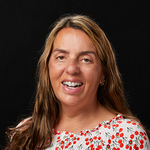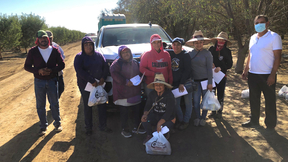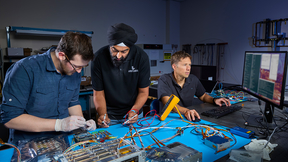Lab scientist receives chemical society award
 (Download Image)
Annie Kersting serves as director of the Laboratory’s Glenn T. Seaborg Institute where she is well known, both nationally and internationally, for her work in actinide environmental chemistry. Photos by Julie Russell.
(Download Image)
Annie Kersting serves as director of the Laboratory’s Glenn T. Seaborg Institute where she is well known, both nationally and internationally, for her work in actinide environmental chemistry. Photos by Julie Russell.
Laboratory geochemist Annie Kersting, who serves as the director of the Lab’s Glenn T. Seaborg Institute, has been selected to receive the 2016 American Chemical Society’s Francis P. Garvan-John M. Olin Medal for distinguished service to chemistry.
The medal recognizes outstanding scientific achievement, leadership and service to chemistry by women and is a national award open to all chemists who are U.S. citizens.
"I was very surprised and humbled because this award is open to all chemists, not just chemists in my field and there are many outstanding women chemists worthy of this award," said Kersting, who started at the Lab in 1992 as a postdoc.
Kersting is well known, both nationally and internationally, for her work in actinide environmental chemistry. She was one of the first scientists to show that insoluble radionuclides, like plutonium, could travel several kilometers in the subsurface environment as suspended, nanometer-sized colloidal particles. This work changed the way scientists think about migration of insoluble actinides.
Most of her current research in the Seaborg Institute, funded by the Department of Energy Office of Science, Biological and Environmental Research, Subsurface Biological Research Program, is to better understand what processes occur at the nanoscale -- at the mineral-water surface that ultimately control the behavior of actinides in the subsurface. The goal is to be able to predict and ultimately constrain the migration of these contaminants in the environment.
Kersting’s educational outreach activities span the range from elementary school children to postdocs. She is the director of the Physical and Life Sciences Directorate’s Postdoc Program, where she has helped develop and now directs a successful postdoctoral program to enhance the experience postdocs to give them the opportunity to develop into fully independent scientists. She manages professional development for approximately 100 postdocs and supervises a staff to help hire, mentor and evaluate postdocs.
Through the Seaborg Institute, she has developed a robust summer program funded by the Domestic Nuclear Detection Office within the Department of Homeland Security in the area of nuclear forensics to encourage graduate and undergraduate students to consider both nuclear forensics and the national laboratories as career choices. "This program is a great pipeline for hiring at the Lab," Kersting said. "The summer program has exposed students to what is possible. Although it is a small program, we have been recognized nationally as a model for enhancing the pipeline in nuclear forensics and to date we have been able to hire about 15 postdocs and 10 staff scientists who were once summer students in the Seaborg Institute’s Nuclear Forensics Summer Program."
Kersting also has participated in Expanding Your Horizons, a daylong event is held for girls, grades 6 to 12, to increase interest in and foster awareness of careers in science, technology, engineering and math (STEM). "This program is strongly supported by LLNL staff and scientists and it is really fun to partner with other women Lab scientists to spend a day teaching classrooms full of budding young scientists. They get so jazzed," she said.She also participates in other STEM youth education events such as Oakland’s "Dinner with a Scientist" and career days at local schools to motivate young adults to think about science and engineering careers. "It gets kids thinking about science careers at a really young age."
Leadership also is something she enjoys doing. "It is an opportunity to give back to the scientific community," she said.
Over her career, Kersting has been selected to serve on a number of committees and review boards. To name a few, she just rotated off of the National Academy of Sciences Review Board for the National Research Council’s Nuclear Radiation Studies Board. She currently sits on the EPA’s Science Advisory Board on its Radiation Advisory Committee. Last year she was on the Helmholtz Review Committee to review Germany’s 5-year Nuclear Energy and High Level Waste Storage Program. She is currently an associate editor of Geochimica et Cosmochimica Acta. She also is on steering committees organizing scientific conferences for many national and international meetings such as, "Migration, Pu Futures, MARC, and Actinides."
Kersting will receive the ACS medal and $5,000 at an awards dinner at the 251st ACS National Meeting in San Diego, California on March 15, 2016.
The ACS was founded in 1876 and is the largest scientific organization in the world with over 158,000 members. The Francis P. Garvan-John M. Olin Medal recognition started in 1936 and is ACS’s second oldest award.
Contact
 Anne M. Stark
Anne M. Stark
[email protected]
(925) 422-9799
Related Links
Annie KerstingGlenn T. Seaborg Institute
Francis P. Garvan-John M. Olin Medal
American Chemical Socieity
Tags
Academic EngagementWomen in STEM
Physical and Life Sciences
Featured Articles








